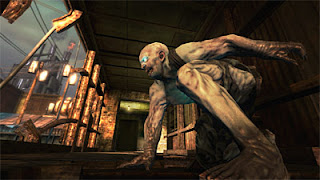
The mighty FPS (First-person shooter) has been the staple of the ever hungry nerd since the spawning of his existence from the primordial soup eons ago. We all know the FPS genre has gone through a few changes with the evolution of physics in Half-Life, the blood and gore of Quake and Doom, and even the progression of storyline in the likes of Bioshock, Fall Out 3 (more so an FPS-RPG hybrid) and even Call of Duty: Modern Warfare 2 with its cinematic beauty and Hollywood styled fast-paced action. Bioshock was a noteworthy achievement in the history of the FPS, not so much as Half-Life which deserves even more credit, but nonetheless it furthered story elements, plot and issues of morality beyond any of its predecessors. Following Half-Life and Bioshock FPS games have continued along this trend adding moral weight and relying heavily on story to support a game through and through. Recently, with the release of the game Singularity developed by Raven Software, who previously worked with id Software on Quake 4, the nostalgia of the genre as a whole is realised.
When you first begin the game you soon come to realise the striking similarities between Singularity and Bioshock. It’s almost as if minimal game development took place, and Raven Software were off drinking coffee, playing some Modern Warfare 2, ate some day old ramen noodles then realised they were game developers. In essence they’ve produced a lacklustre ‘Borat’ of a game, which as this review will explain, lacks a cohesive story and relies too heavily on repetitive gameplay. In Singularity you play as Renko, a member of an American reconnaissance team, who is investigating the island called Kartorga-12. On the island a catastrophe occurred involving the Element 99 leading to the formation of a ‘singularity’ causing a nuclear fall out, which mutated much of the island’s inhabitants. As the player progresses in the game it becomes apparent that the Soviet Union was pulling a fast one, covering up the horrific experiments they conducted on the island. The result is a variety of Element 99-powered monsters with abilities ranging from teleportation to super human strength. But, don’t worry of course you have some firepower on your side and the TMD (Time Manipulation Device) which gives you mastery of time in all of its glory. With the TMD you can age enemies to dust, move objects backwards and forwards in time and shoot opponents with bursts of time-force killing them in the process. This becomes handy when faced with puzzles and the barrage of enemies you encounter as you travel through the game.
Graphically, Singularity is a beauty to behold utilising the Unreal 3 engine in all its full glory. Everything flows naturally in-game like a well oiled AK-47 in motion firing rapid-fire in a fit of lunacy. Models are highly detailed and the monsters are somewhat non-threatening, offering little of what other horror games achieve on a visual level. Singularity visually brought the world of Kartoga-12 (in all its deformed beauty to life). Yet, at times it felt as if Singularity was more dependent on the graphical side of things, rather than developing a more intriguing plot and storyline.
Now you’re probably wondering how can Singularity be compared to Bioshock, is this dude on crack or something, or has this guy got a few screws running loose. God knows, but Singularity in its design and the way it pans out attempts to be what Bioshock was, with a design approach that is eerily close to said game. Everything down to the voice recordings and 50s styling is all so similar, except for the game being set on dry land and your fight in this instance is against a deranged Soviet dictator. Gameplay involving the TMD is just a substitute for the plasmids from Bioshock which offered more in terms of the powers you could use. In Singularity the variety of time powers is limited, and at times feels like it could have been more fully utilised for its potential. Singularity is also lacking in the story department and ends up being s half-hearted attempt of trying to horrify the player, and doesn’t effectively create tension. On the other hand a game like Metro 2033 achieves tension effortlessly and (albeit more successfully) than Singularity, with the extended periods of silence and sudden scares that come at you out of nowhere. At the end of it all Singularity is so-so and doesn’t do anything new within the genre. Its reminiscent of old-school shoot-em’ up violence, and if that’s what you’re looking for go ahead and buy it. However, the game suffers from flat characters and a cheesy story which leaves Singularity sorely predictable. Time could be more well spent playing a game like Borderlands (with its extensive DLC) if you’re tiring of the whole ‘time travel’ thing.
Singularity is average at best and offers nothing new ending up as a big disappointment with loads of lost potential.








1 comments:
http://downloads.khinsider.com/?u=328647
Post a Comment